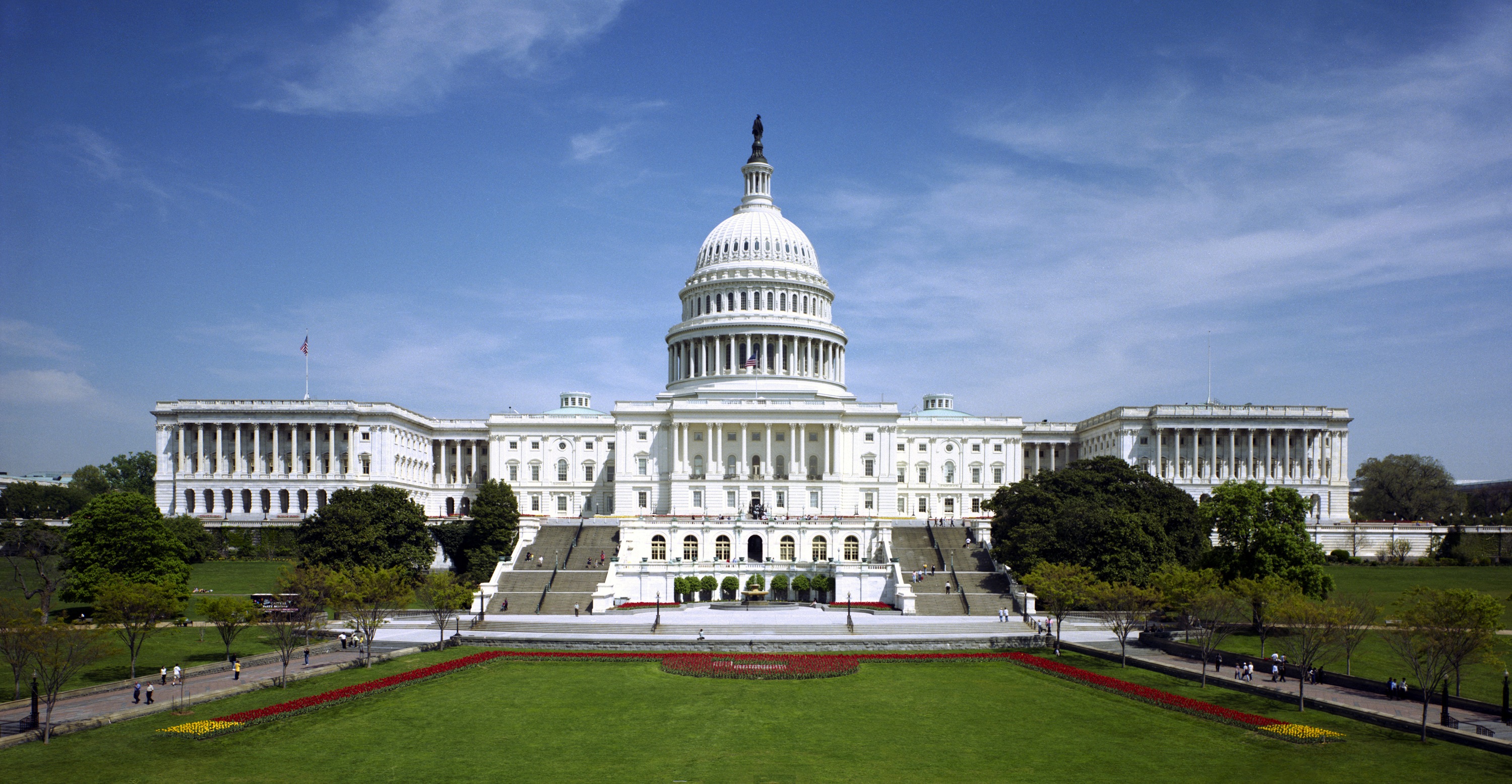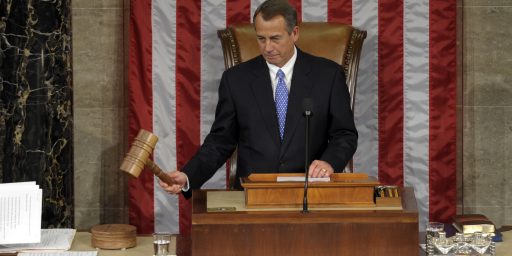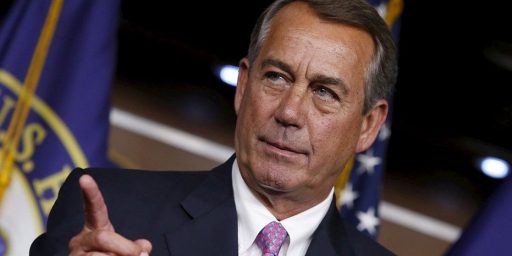Despite Last Minute Drama, House Narrowly Passes Bill To Fund Most Of The Government
Despite opposition from both Republicans and Democrats, the compromise budget resolution passed narrowly last night, but not without some last minute drama
After a day of drama in which it seemed for a time that it might not actually pass, the House of Representatives actually managed to pass the so-called $1.1 trillion “Cromnibus” bill that funds most of the Federal Government through the end of the current Fiscal Year, and the Department of Homeland Security through March, but it required the intervention of the White House to head off a rebellion inside the House Democratic Caucus inspired in no small part by Minority Leader Nancy Pelosi and Massachusetts Senator Elizabeth Warren over a provision that allegedly weakens certain banking regulations:
WASHINGTON — The House narrowly passed a $1.1 trillion spending package on Thursday that would fund most government operations for the fiscal year after a rancorous debate that reflected the new power held by Republicans and the disarray among Democrats in the aftermath of the midterm elections.
The accord was reached just hours before the midnight deadline, in a 219-206 vote, amid the last-minute brinkmanship and bickering that has come to mark one of Congress’s most polarized — and least productive — eras. The legislation now heads to the Senate, which is expected to pass it in the coming days.
The split in the Democratic Party dramatically burst into view when Representative Nancy Pelosi, the minority leader and one of President Obama’s most loyal supporters, broke with the administration over a provision in the bill that would roll back regulation of the Dodd-Frank Act, which Ms. Pelosi said was a giveaway to big banks whose practices helped fuel the Great Recession. She spoke on the House floor in the early afternoon, expressing her strong opposition to the bill.
Mr. Obama and Vice President Joseph R. Biden Jr. were pressed to make a furious round of phone calls to try to persuade wavering Democrats, while House Speaker John A. Boehner worked to get more Republican votes.
The public support of the sweeping spending bill by the White House — which came just as Ms. Pelosi was making her speech on the House floor opposing it — was a rare public break with the minority leader and infuriated many of her loyalists.
In a more than three-hour, closed-door meeting of House Democrats on Thursday night, many of the party’s more liberal members tried to rally support against the bill. The moment, they said, was one of conscience, and a chance for Democrats to demonstrate their allegiance with the middle class.
“We’ve got to stand up for principle at some point, or they’re going to kick us even more next year when they have a bigger majority,” said Representative Peter A. DeFazio, Democrat of Oregon. “They know we will stand our ground on principle in the future and not roll us so easily again.”
In an emergency gathering, Democrats also expressed anger at Denis R. McDonough, the White House chief of staff, at what they saw as the president’s undercutting of Ms. Pelosi and other progressives by coming out in support of the deal so early in the day. But Ms. Pelosi ultimately gave her members the freedom to vote how they wanted. “I’m giving you the leverage to do what you have to do,” she said. “We have enough votes to show them never to do this again.”
The final vote was a blow to Ms. Pelosi, the liberal wing of the party and Senator Elizabeth Warren, Democrat of Massachusetts, who led the charge against the Dodd-Frank rollback. Mr. Boehner built a coalition of 162 Republicans and 57 Democrats, a rare achievement for a Congress that has often operated along strict party lines. Congress also passed a two-day funding measure to give the Senate time to pass the legislation.
With an opportunity to return to a more conventional legislative process — funding the government for a fiscal year rather than for months at a time — Republican leaders had thought they had sufficient bipartisan support to pass the bill. The adopted measure funds the government through Sept. 30, 2015.
But an early sign of the headwinds facing the legislation came around noon, when the deal barely cleared a procedural hurdle to allow a vote. In several tense minutes on the House floor, support to move forward on the package seesawed, with Democrats shouting “Call the vote” and Republicans holding it open until they were able to persuade two lawmakers to switch their votes.
House Democrats — who were already trying to strike a delicate balance — found their calculation complicated by the White House, which released a pre-emptive signal that Mr. Obama would sign the bipartisan legislation if it made it out of Congress.
Josh Earnest, the White House press secretary, said the administration agreed with congressional Democrats who were angry about several provisions that affect financial regulations and others that would allow larger political contributions to parties during federal campaigns. But he called the funding bill “a compromise” and said passage of the legislation would be good for the economy and would bolster some of the president’s priorities, including consumer protection, early childhood education and the fight against climate change.
Postponing action on the spending bill until next year would not have been good for either party. Republicans were eager to get the package behind them so they could start 2015 with a fresh agenda. And although Democrats found some provisions of the spending bill objectionable — including a measure that would significantly increase the limits on individual contributions to political parties — the package was negotiated on a bipartisan basis and they probably would have been forced into greater concessions next year.
Not everyone on the right was happy with the deal, either. Some House Republicans thought that Mr. Boehner did not go far enough in fighting Mr. Obama over his executive action last month to defer the deportation of as many as five million unauthorized immigrants. The spending deal funds the Department of Homeland Security — the agency primarily assigned to carry out the president’s immigration policy — only through February, at which point Republicans will control both chambers of Congress and have the leverage to try to curtail Mr. Obama’s action.
But some conservatives wanted to immediately defund the Homeland Security agency, despite the risk of a partial government shutdown. After the bill was passed, Representative Steve Scalise, Republican of Louisiana and majority whip, said that the vote “set the stage for a battle with the president” over his immigration action.
The liberal base of the Democratic Party, led by Ms. Warren, also found itself in an unlikely alliance with the Tea Party wing of the Republican Party. Both opposed the Wall Street bailout of 2008 and feared that the spending measure would not only provide a bounty for big banks but would also help cause another economic crisis. But last year, 70 House Democrats voted for a bill that included the very change to the Dodd-Frank regulations that their leadership opposed this week.
Unlike previous showdowns in the 112th and 113th Congresses, this showdown and near defeat was one that involved a rebellion inside Democratic ranks rather than one that was being principally engineered by the Tea Party wing of the Republican Party. Led principally by Massachusetts Senator Elizabeth Warren, many Democrats in the House were objecting to provision in the massive 1,600 page bill that changed certain portions of the Dodd-Frank Law regulating banking activities that allegedly loosen the regulation regarding the trading in derivatives by financial institutions, while others objected to a provision that significantly increased the amount that could be donated to political parties as part of a provision that ended the program of Federal Election Commission subsidies. The showdown also turned into something of a last stand for Minority Leader Nancy Pelosi, who will find her position in the House significantly reduced starting in January thanks to a new Republican Majority that will be larger than any seen since the 1940s or, depending on the outcome of a still-outstanding race in Arizona, 1929. In the end, though, Pelosi found herself up against the combined forces of the GOP majority and the Obama White House, which put its own weight behind getting Democrats to sign on to voting for the bill via a last minute round of phone calls to members from both President Obama and Vice-President Biden, and an unusual visit to Capitol Hill by White House Chief of Staff Denis McDonough, who showed up on Capitol Hill late in the afternoon to speak at a meeting of the House Democratic Caucus. It took several hours after that for the votes to start to bend, but shortly before 9pm, the House reconvened and the bill passed. It was messy, the bill is far from perfect, but at the very lease a shutdown was averted, which is really all that the House GOP Leadership was aiming for in this entire process. From here, the matter goes on to the Senate where, notwithstanding what is likely to be some drama there as well, it is likely to pass easily, and Congress will head out of town essentially ending the 113th Congress even though pro forma sessions will continue to be held until January 3rd.
Democrats weren’t alone in their opposition to the so-called “Cromnibus,” of course, Republicans had their own reasons for being upset about it, principally the fact that many on the right felt that the leadership had surrendered in the fight against the President on immigration, and that’s likely to have implications once 2015 rolls around:
Conservatives began the lame-duck session enraged over President Barack Obama’s executive actions on immigration and hell-bent on unraveling the moves they saw as illegal, unconstitutional and just plain wrong.
Now they’re ending the year frustrated at their own party’s leaders, who they think cut them out of the funding process and fumbled a chance to pick apart Obama’s immigration actions as soon as they were announced by not using the must-pass funding bill to undo it.
So as the party prepares to take the majority in both chambers next year, conservatives are sure to hold Speaker John Boehner and the GOP leadership to their word that now that the “cromnibus” spending bill has passed in the House, they’ll take the fight with the president into 2015.
A clearly put-out Rep. Mo Brooks (R-Ala.) groused: “We call it the crummybus.”
“If the other team on the field — Barack Obama and the Democrats who promote illegal aliens over American citizens — stop us, then you punt,” Brooks said, using a football analogy. “But you punt on fourth down, not first down. And right now, the House leadership, for whatever reason, thinks it’s best to punt without running a play.”
Conservatives who were ticked off over the bill almost got to see it go down. The massive bill barely squeaked through a procedural vote earlier Thursday, and then the House went dark for hours before leaders were confident enough votes were in place.
Republican Reps. Steve King of Iowa and Michele Bachmann of Minnesota said they devised a plan and presented it to Boehner: a 60-day continuing resolution for all government agencies with language that would undo Obama’s immigration actions. They didn’t get their way.
“We almost brought the rule down,” Bachmann said Thursday. “We almost won. But then you heard the bones breaking, with the arms that were twisted. But we almost won.”
In other words, expect a showdown over immigration in the new Congress. That was to be expected, though, and what this bill guarantees is that the opponents of the President’s executive action cannot use the threat of a government wide shutdown as a leverage in that fight. In the end, that was obviously what Speaker Boehner and the leverage intended with their maneuvers here and, since they were able to pull it off, that largely means that the protests over the policy will be almost completely toothless. It’s hard not to reach the conclusion that this is exactly what Boehner and the others intended.






Well at least Citigroup’s lobbying money was well-spent. Republicans simply passed the bill that the lobbyists wrote verbatim. A perfect process, really, for the do-nothing Republicans.
And the last time we had to bailout the banks was so much fun…why not do it again???
As much as I hate rolling back Dodd-Frank, I’m not sure this is a concession that will make a practical difference. It’s not like Congress was going to fund the FTC or SEC at a level that would make actual enforcement possible…
@C. Clavin:
How many Democrats voted for it? And who was it that inserted the Dodd-Frank rollback on derivatives? Does anybody even know? At least the Republicans made President Obama happy, but failed to bring 67 of their own along.
Karl Denninger at Market-Ticket comments on this: http://market-ticker.org/akcs-www?post=229655
@Another Mike:
It really doesn’t matter. Once you accept the institutionalization of torture…everything else just follows.
This was a very easy call.
Some Democrats can pretend to be outraged (good for the base) , but as a practical matter they gave Republicans nothing, and they prevented another Republican shutdown of the federal government
@al-Ameda:
“This was a very easy call.
Some Democrats can pretend to be outraged (good for the base) , but as a practical matter they gave Republicans nothing, and they prevented another Republican shutdown of the federal government”
I don’t feel the Democrats gave up nothing, but they gave up a lot less than they would have to if a 3 month extension passed and Obama needed to negotiate with the new Congress in February. With a deal in place through the end of September, hopefully there will be only 1 bite at the apple in 2015.
Well, at least, the Democrats took a stand for once on an issue important to the base. It’s something, I suppose. You have to start somewhere. Warren’s star shone a little brighter. That’s about it.
On to the 114th Congress and real danger of a government shutdown!
@stonetools:
When Republicans refuse to vote for a continuing resolution, it’s “terrorism”.
When Democrats refuse to vote for a continuing resolution, it’s “taking a stand”.
@Another Mike:
Rep. Kevin Yoder helps big banks undo taxpayer protection
@DrDaveT:
I’m not sure this is a concession that will make a practical difference.
It will when the taxpayers have to foot the bill for a couple trillion dollars of TBTF gambling debts. And you wonder why no one shows up to vote for the Democrats in midterms?
@edmondo:
You completely missed my point, which was that we will foot those bills with or without Dodd-Frank, because a Republican legislature will not fund enforcement of the statute at any useful level. As with tax collection, the level of compliance is determined by the level of enforcement. The Republican strategy for tax collection, environmental regulations, labor law, etc. has always been to gut the enforcement, then argue that the law doesn’t work — it’s a microcosm of their approach to government in general.
@edmondo:
If Democrats were in a stronger position then that wouldn’t have been a concession that would have had to be made. Democrats not showing up for the midterms are exactly why this is happening.